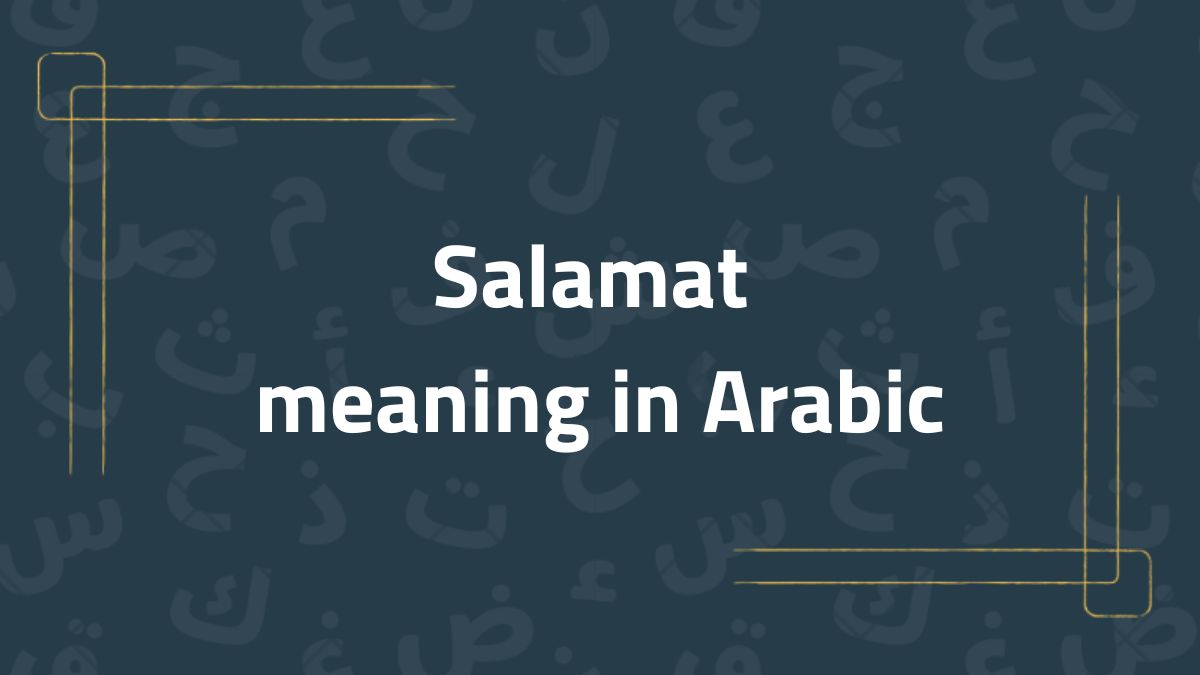The Word "Salamat" Meaning in Arabic With Examples

The Arabic word “salamat” (سلامات) is commonly used in everyday conversation. It carries meanings related to safety, well-being, and blessings. This article explains the meaning, usage, and cultural significance of “salamat” in Arabic, along with examples to help learners understand it better.
The Meaning of “Salamat” in Arabic
“Salamat” (سلامات) translates to “safety,” “well-being,” or “blessings” in English. It is derived from the root word “salam” (سلام), which means “peace.”
The pronunciation of “salamat” is:
-
Sa-la-mat (stress on the first syllable).
It is often used in greetings, farewells, and expressions of goodwill.
Linguistic Root and Grammatical Usage
The word “salamat” comes from the Arabic root “S-L-M” (س-ل-م), which relates to peace, safety, and submission (as in Islam).
Grammatically, “salamat” can function as a noun or part of a phrase. Variations include:
-
“Salam” (سلام) – Peace
-
“Salama” (سلامة) – Safety
-
“Muslim” (مسلم) – One who submits to God (from the same root)
In different contexts, the word may change form:
-
“Salamatkum” (سلاماتكم) – Your safety (plural)
-
“Al-salama” (السلامة) – The safety
Examples of “Salamat” in Arabic Sentences
-
“الله يحفظك بالسلامة”
-
Transliteration: “Allah yahfazk bil-salamah”
-
Translation: “May God keep you in safety.”
-
-
“سلامات على قلبك!”
-
Transliteration: “Salamat ‘ala qalbak!”
-
Translation: “Blessings on your heart!” (A kind expression)
-
-
“رجعنا بالسلامة”
-
Transliteration: “Raj’na bil-salamah”
-
Translation: “We returned safely.”
-
Cultural or Quranic Significance of “Salamat”
The root “S-L-M” is central in Islamic teachings. The Quran frequently uses words like:
-
“Islam” (إسلام) – Submission to God
-
“Salam” (سلام) – Peace (used in greetings like “As-salamu alaykum”)
While “salamat” itself is not a Quranic word, it is deeply connected to Islamic culture, often used in prayers and well-wishing.
Common Misunderstandings or Mistakes
-
Confusing “salamat” with “salam”:
-
“Salam” means “peace,” while “salamat” refers to “safety” or “blessings.”
-
-
Mispronunciation:
-
Some learners stress the wrong syllable (e.g., “sa-la-MAT” instead of “SA-la-mat”).
-
Why You Should Learn “Salamat”
Understanding “salamat” helps in:
-
Daily conversations (greetings, farewells).
-
Understanding Islamic culture (many phrases use this root).
-
Reading Arabic texts (recognizing related words).
Conclusion
The word “salamat” (سلامات) carries meanings of safety, well-being, and blessings in Arabic. It comes from the root “S-L-M,” which is key in Islamic teachings. Learning this word improves communication and cultural understanding. Use it in greetings, prayers, and kind expressions to sound more natural in Arabic.
Discover the Quran and Arabic with Shaykhi Academy
We highly recommend Shaykhi Academy for anyone seeking to learn the Quran and Arabic with excellence. The academy is known for combining expert teaching with a compassionate approach, making it a top choice for students worldwide who want to connect deeply with the words of Allah.
At Shaykhi Academy, you’ll find highly qualified teachers who specialize in guiding learners of all ages and levels. Whether you’re just beginning your journey with Arabic letters or aiming to master Tajweed and Quran recitation, their personalized lessons ensure steady progress at your own pace.
With engaging classes, flexible scheduling, and a focus on both spiritual and linguistic growth, Shaykhi Academy makes learning both enjoyable and impactful.
Watch a sample class below to see Shaykhi Academy in action:
Learn Arabic, Quran, And Tajweed With Free Trial!
Make your home a place of faith, understanding, and connection with the Quran. Whether you're starting from scratch or deepening your knowledge, Shaykhi Academy is here to guide you — step by step. ✅ Tailored for all ages ✅ Clear, structured learning ✅ Flexible online sessions ✅ Book your free trial session now!
Learn More
